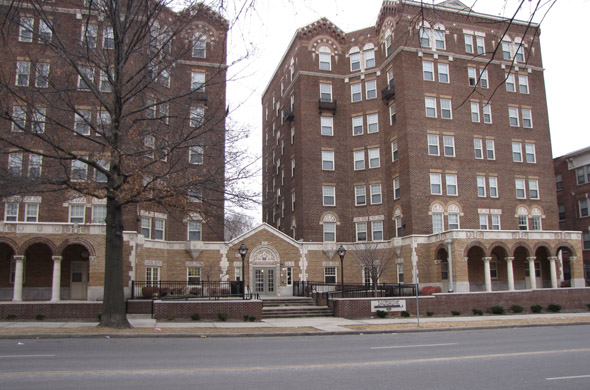Three Armour Boulevard properties redeveloped as lower income housing have increased crime so badly that the Armour corridor is socially blighted, according to a new report.
It is the first time a social liability blight designation has been sought in Kansas City.
The Redevelopment Coordinating Committee heard the report last week and forwarded it to the City Plan Commission.
If approved by the city council, city staff said, the city will use the social blight finding to pressure changes by Eagle Point Cos., LLC, of Maine, which redeveloped and manages the three properties.
An Eagle Point manager in Kansas City declined comment other than to say corporate staff will be at the Jan. 7 Plan Commission meeting.
A corporate spokesman could not be reached for comment Monday.
The Bainbridge Apartments, 900 E. Armour, is the main property that has prompted complaints about crime from neighbors and others.
It consists of 162 units in five buildings, is on the national historic register and underwent a $45 million renovation in 2007 and 2008.
The other two renovated properties are the Georgian Court, 400 E. Armour with 90 units and the Linda Vista, 1301 E. Armour with 51 units.
The blight report for the city and Planned Industrial Expansion Authority is by Pat Sterrett and uses statistical analysis of police records to document crime trends.
It states: “As evidenced by the z-scores in the above charts, the reopening of the Bainbridge Apartments had a tremendous impact on crime, both with respect to total crimes and violent crimes, as the z scores made a tremendous jump beginning in 2008.”
From 2010 to 2012, it states: “the Georgian Court Apartments has the highest level of total crime, due in part to property crimes and society crimes. Over the past three years the Bainbridge Apartments has the highest level of violent crime of the three properties which is also the most visible to the surrounding neighborhoods and which has caused the highest level of concern.”
Councilman Jim Glover, who lives in north Hyde Park, said he has been involved in the combating the problem but has not interfered with city staff.
The city needs to use the social blight finding to prompt better management and more, he said.
The company has overloaded the Bainbridge with low income housing voucher renters, Glover said, and that is causing crime problems that hurt residents as much as anyone else.
“It’s not the way to treat people,” he said, and there needs to be more of a mix of people who have higher incomes.
“The city is prepared to aid in relocation so no one would lose a place to live,” he said.
The crime problem is also hurting efforts by MAC Properties to extend its redevelopment work east of Troost, Glover said.
MAC Properties and Silliman Group have renovated about 20 historic buildings on Armour to market rate housing. Peter Cassel, their director, said he supports the social blight designation.
“This is an important step to give the city some of the tools to continue toward pushing them (Eagle Point) to be responsible owners,” he said. “It’s a problem for people who live in the buildings, the neighborhoods and all of Kansas City.”
The report notes that blight from “social liability” is not defined by state law or in case law except for one 2007 Missouri Supreme Court opinion.
Areas can be blighted when they constitute “menace injurious to the public health, safety, morals and welfare” of residents, the court stated.
The need to eliminate conditions that are “a breeding ground for juvenile delinquency, infant mortality, crime and disease” can prompt redevelopment, it stated.




Trackbacks